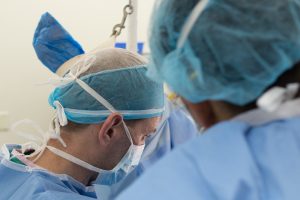Global surgery has received sorely needed attention in more recent years. Given the limited surgical capacity of low and middle income countries (LMICs), it is estimated that 5 billion people lack access to safe and affordable surgical care and that 143 million additional surgeries are needed to save lives and prevent disability due to surgical disease.1 In 2015, the Lancet Commission on Global Surgery (LCGS) was purposed to promote widespread access to safe and high-quality surgical care.1 As part of its efforts, the LCGS forwarded a group of 6 core indicators and related goals to be used for assessment of efforts to improve worldwide surgical and anesthetic care access by 2030. Such metrics, including specialist surgical workforce density, were widely supported by global health leaders given the lack of established indicators for progress and the need to rapidly introduce a framework for surgical care expansion.2
Despite these actions, research assessing these global surgery indicators shows that we remain far from the 2030 goals set by the LCGS.3–5 The implications of this surgical void are profound. In addition to resultant mortality, morbidity and quality of life impacts, the lack of surgical care has equally deleterious impacts on the financial well-being of both individuals with surgical disease and, on a larger scale, LMICs themselves.

Unfortunately, the COVID-19 pandemic has further impacted global surgery efforts, presenting both barriers to established programs as well as new challenges. Global Surgical Expedition (GSE) is a medical charity that provides surgical care internationally to populations in need. Since 2012, GSE has provided nearly 400 urological and urogynecologic surgeries in Belize and Rwanda to help treat surgical disease. Similar to most international global surgery organizations, GSE has largely suspended its on-site global surgery trips as a result of the pandemic. Although necessary, the impact of this suspension to the urological infrastructure developed over the last decade has been significant.
While this impact has been disappointing, GSE has also approached this period as an opportunity to place focus on numerous other programs critical to the global surgery effort. Accordingly, GSE has advanced its research initiatives to help better understand the financial impact of urological disorders in LMICs. As part of this, our recently completed data now demonstrate that, in a cohort of urological patients in Belize, their urological disorder results in a loss of over 10% of their annual income potential. This finding suggests that a routine surgery for benign prostatic hyperplasia or pelvic organ prolapse not only can positively impact quality of life, but also can have an enormous positive impact on the financial health of urological patients and their dependents.
Another area of focus has been GSE’s advocacy efforts. Certainly, advocacy remains the cornerstone of generating the worldwide support needed to provide safe and affordable surgical care to all. On a larger scale, GSE is a committed member of the G4 Alliance. This organization is a group of more than 70 academic institutions, professional societies, nonprofit organizations and other organizations working in over 160 countries with the mission to advocate for increased access to safe, essential and timely surgical, obstetric, trauma and anesthesia care. Advocacy opportunities have also been present with GSE’s individual international partners. GSE recently visited numerous health care leaders across Belize not only to discuss needs related to the COVID-19 pandemic, but also to reinforce awareness regarding the urological need and necessary program support.
Further, GSE has placed focus on its educational efforts. A founding vision of GSE was to foster the next generation of global surgery leaders. In addition to providing international global surgery experiences for residents and students, GSE has also sought to provide more formal educational opportunities and curricula. In conjunction with the University of Virginia Global Health Leadership Track, GSE was proud to support the development of a formal certificate program in global surgery/urology and recently celebrated its first resident graduate, Dr. Clint Yeaman (see figure 1). These experiences have reinforced GSE’s strong belief in the value of formal global surgery training programs and the need for support from the urological community and leadership. (continued)
Originally Published On: 01 Apr 2022